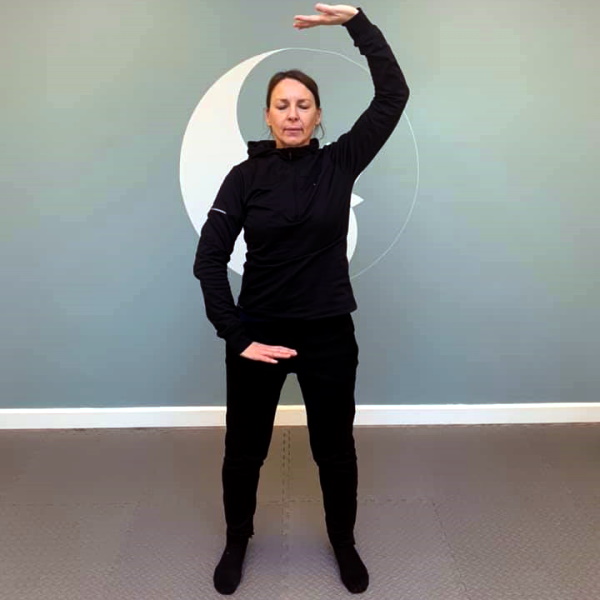Know More
About Jenna
This page is about everything from me, Jenna Robins, Acupuncturist and Instructor of Tai Chi Chen Style. Plus great tips and advice and links to interesting websites.
Expertise Areas
TCM Acupuncture for complex health conditions
Qi Gong and Tai Chi classes for beginners for self help wellbeing
Self help tools: Acupuncture Tapping, Focused Mindful Breath Techniques, Medicinal Remedies and Diet & Lifestyle Advice
Qualifications
BSc (Hons) in TCM-Acupuncture
BSc (Hons) in TCM Massage Body Work
Practitioner Diploma in Therapeutic Deep Tissue Massage LCM (Dip)
Experience
25+ years of clinical experience using a multi method approach for positive results
Former Manager of Neal’s Yard Remedies in Covent Garden (London) & Manchester
Subject Matter Expert
Freelance Writer & Columnist
Holistic chat show host on Manchester BBC Radio
Creditations
Member of the British Acupuncture Council (MBAcC)
Fully Insured
Author
Jenna’s first book, “The 6 Minute Method: Energy Medicine for Wellbeing & Vitality” was published in 2022
Find out more about
Wilmslow Acupuncturist and Qi Gong & Tai Chi Chen Style Instructor
Jenna applies a multi-method treatment approach to help achieve results for her patients from her Cheshire clinic. She also teaches Qi Gong and Tai Chi classes for beginners, both from her Wilmslow studio and on corporate well-being, workshops and retreats.

About Jenna Robins
It is my passion and mission to help return you to optimum health and wellness, to feel mental and physical wellbeing in your daily life. Through the treatment of Acupuncture, massage, guided self-help tools, Tai Chi Chen Style, Qi Gong, breath work, mindfulness, diet and lifestyle, remedies and vitamins and if required appropriate referrals to other health care specialists.
I thrive on watching my patients health flourish, I aim to achieve positive outcomes for patients and with the right care plan and support it can be life changing.
More About Jenna
Jenna Robins graduated from Salford University obtaining a BSc Hons (Bachelor of Science with honours degree) in TCM (Traditional Chinese Medicine), Acupuncture and Body Work. Jenna previously qualified from the London College of Massage where she spent her time working in successful clinics while training to work in Hospital Theatres, also gaining experience in rehabilitation at The Devonshire Hospital, London.
After working in the NHS, private practice and hospitals in the UK and China (Teaching Hospital of Tianjin), she naturally progressed on to study the healing art of Qi Gong and Tai Chi Chen Style for her own personal well-being and to empower patients with self-care skills for mental and physical health.

WHAT ARE YOU WAITING FOR...
Book now!
Jenna has appointments available in her Wilmslow clinic. To make an appointment, click the button below. To speak to Jenna prior to your appointment please text 0777 623 4575.
What Jenna's clients say
Jenna has many positive reviews from treating patients with PTSD, burn out, mental health, chronic health, post viral fatigue and more.
What can Acupunture help with?
Acupuncture for weight loss
Acupuncture can be valuable in weight loss efforts. It can address various factors that can contribute to excess weight and promoting a healthier lifestyle. While acupuncture itself does not directly cause weight loss, it can support weight management in several ways.
Acupuncture sessions often focus on specific points that may help reduce food cravings and curb overeating. It does this by balancing hormones and regulating the appetite. Furthermore, acupuncture can aid in stress reduction and improving sleep patterns. This essential for maintaining a healthy weight, as stress and inadequate sleep can lead to weight gain.
Additionally, by using Acupuncture for weight loss, you can stimulate the release of endorphins, promoting a positive mood and reducing emotional eating. By addressing both the physical and emotional aspects of weight management, acupuncture can be a complementary approach to support individuals in their weight loss journey when combined with a balanced diet and regular physical activity. However, it should not be considered a standalone solution and consulting with a healthcare provider or registered dietitian is recommended when incorporating acupuncture into a weight loss plan.
Acupuncture for Anxiety
Acupuncture is recognised as a potential complementary therapy for anxiety management. This is due to its multifaceted effects on the body’s physiological and psychological systems. This ancient Chinese practice involves inserting fine needles into specific acupuncture points. This is believed to influence the flow of energy or Qi within the body.
How does Acupuncture for anxiety work? Acupuncture is thought to help reduce anxiety by stimulating the release of endorphins, which are natural mood elevators and pain relievers. Additionally, it can regulate the autonomic nervous system, balancing the sympathetic (fight-or-flight) and parasympathetic (rest-and-digest) responses. All this means that it’s able to reduce the body’s stress response. Acupuncture may also impact neurotransmitters like serotonin and gamma-aminobutyric acid (GABA), which play crucial roles in mood regulation.
By addressing both the physical and emotional aspects of anxiety, acupuncture provides a holistic approach to stress reduction and emotional well-being. It offers potential relief for individuals seeking non-pharmacological solutions to anxiety disorders. However, it’s essential to consult with a qualified acupuncturist like Jenna, when considering acupuncture as part of an anxiety management plan.
Acupuncture for Sciatica
Acupuncture has been found to offer relief from sciatica, a condition characterised by pain along the sciatic nerve, which extends from the lower back down to the legs.
This ancient Chinese healing technique is thought to work for sciatica by addressing multiple aspects of the condition. Acupuncture involves the insertion of thin needles into specific acupuncture points that correspond to energy pathways or meridians in the body. It is believed that this process stimulates the release of endorphins, the body’s natural pain relievers, which can alleviate the intense pain associated with sciatica.
Acupuncture may also promote better blood circulation, reduce inflammation and relax muscles around the affected area. It can therefore further contribute to pain reduction and the healing process. Additionally, it can help address underlying issues such as muscle tension, spinal misalignment or nerve compression, which are often associated with sciatica.
While individual responses to Acupuncture for sciatica can vary, many patients report significant improvements in their sciatica symptoms. It is therefore acknowledged that it’s a valuable complementary therapy for sciatica management.
Acupuncture for Hayfever
Chinese Acupuncture can be a beneficial option for managing hay fever, also known as allergic rhinitis. It is able to alleviate allergy symptoms and enhance overall well-being. During acupuncture sessions, fine needles are inserted into specific points on the body, which can help regulate the immune system and reduce inflammation, two key factors in hay fever.
Acupuncture is believed to modulate the release of histamines and other immune system components responsible for allergy symptoms like sneezing, runny nose and itchy eyes. Moreover, it can address underlying issues related to immune system imbalances and hypersensitivity. Additionally, acupuncture often promotes relaxation, which can help mitigate stress, a known trigger for hay fever exacerbation.
While Acupuncture for Hayfever may not provide a complete cure, many individuals find relief from their symptoms and a reduction in the need for allergy medications. Regular acupuncture treatments offer valuable complementary therapy for managing seasonal allergies. Consulting with a qualified acupuncturist can provide personalised insights and treatment plans for hay fever relief.
Acupuncture for Insomnia
Acupuncture offers a holistic approach to addressing insomnia by targeting both the physical and psychological aspects of sleep disturbances. Chinese Acupuncture involves inserting fine needles into specific acupuncture points to regulate the body’s energy flow.
For insomnia, acupuncture can help by promoting relaxation and reducing anxiety, which are common contributors to sleep difficulties. It is believed to stimulate the release of endorphins and improve the production of melatonin, the hormone that regulates sleep-wake cycles. Acupuncture may also address underlying issues such as chronic pain, hormonal imbalances, or stress-related factors that disrupt sleep.
By addressing these root causes and promoting overall well-being, acupuncture can be an effective complementary therapy for those seeking relief from insomnia and aiming to achieve a more restful and rejuvenating night’s sleep. However, individual responses to acupuncture may vary, and it’s advisable to consult with a qualified acupuncturist and healthcare provider when considering acupuncture as part of an insomnia management plan.
cheshirecbt.com - Sarah Rees has 20 years experience in the field of mental health and now manages a successful CBT private practice in the heart of Wilmslow.

